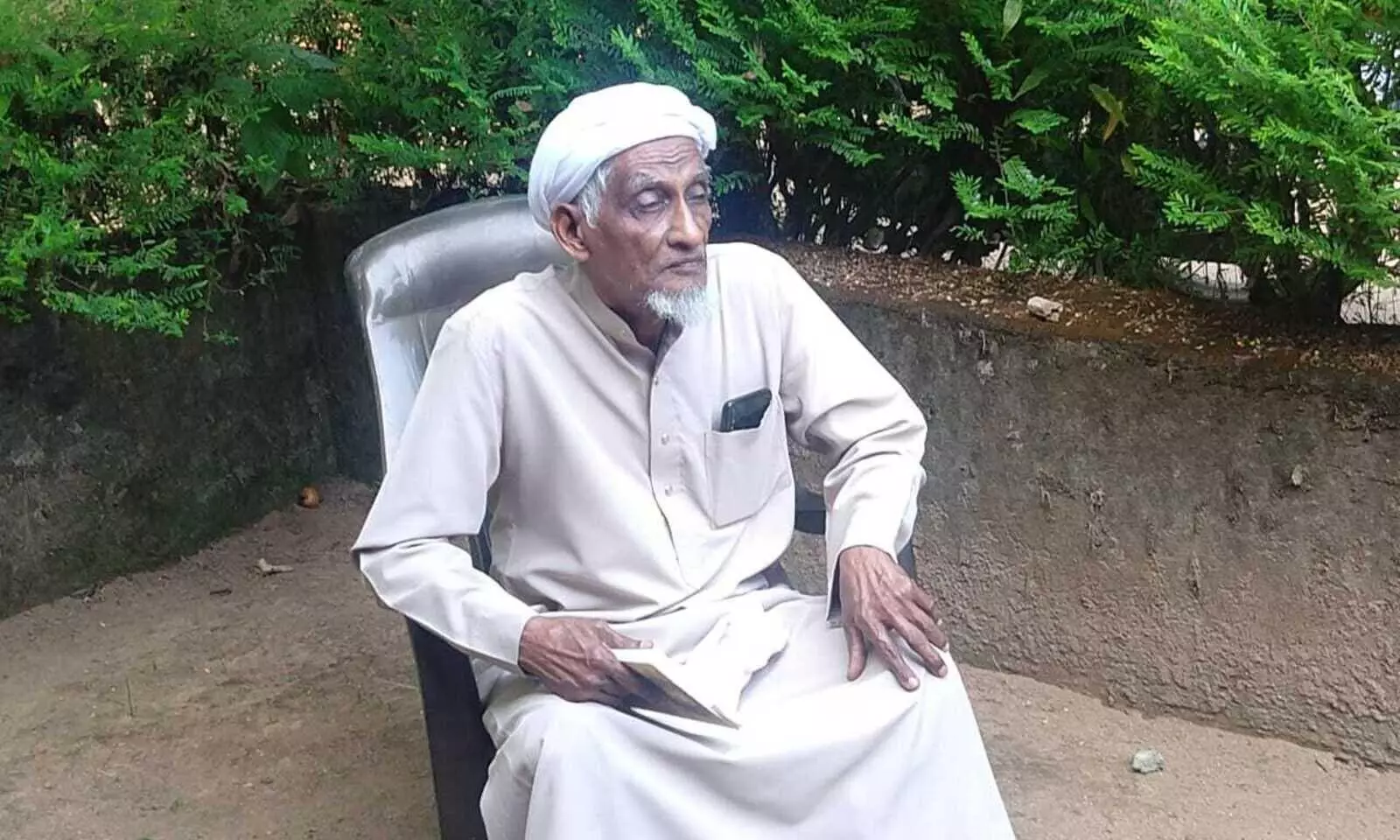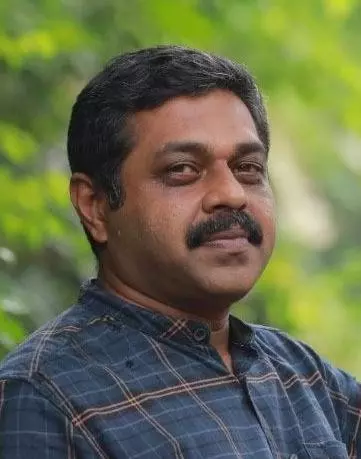

A different fish in the sea of knowledge - Ali Manikfan
text_fieldsThere is a sea fish by the name 'Abudefduf Manikfani' – a rare species of fish that wouldn't get caught in any net – so is the man after whom the fish is named: a different avatar of fish who swims in the ocean of knowledge without giving himself to any net – M Ali Manikfan. One fond of the depths of the ocean as much as of knowledge, a man who has a feel for land, sea and sky equally. Anyone would be at a loss on how to characterise his life and accomplishments.
Oceanographer, astronomer, geologist, social scientist, technologist, environmental champion, agriculture expert, nature watcher, Muslim scholar and polyglot - so go the epithets that can match the makings of this man. A seventh grade drop-out who can read, speak and write in 14 languages including Malayalam, Sanskrit, Hindi, Tamil, Arabic, Urdu, Latin, French, Russian, German, English and Persian besides Mahl, the native tongue of Lakshadweep. How can one who had received only three years of formal liberal education achieve all this? The answer lies in Manifan's very life: 'If you have the will, you can learn anything."
On Monday when the declaration came on his being listed among the 102 winners of the Padma Shri award this year, the third highest civilian honour of India, there was no perceivable change in Manikfan, who has religiously maintained his simplicity and humility in life and attire. When close acquaintances called him on knowing about the award, it was his wife who answered, "he has gone to bed". That was his wont even earlier: he never waited for, let alone seeking, accolades. It is another matter that despite all his amazing accomplishments, he was not given due recognition and people would not know him for what he was. To the curious ones who sought answer to this, his reply would be, "In the desert, numerous types of flowers blossom and fade. My life is like that."
Lessons from land and sea
Manikfan was born to B Moosa Manikfan and Fathima Manikka on 16 March 1938 in Minicoy island of the Lakshadweep archipelago in the Arabian Sea. His father was a court clerk, called 'aameen'. Since ameen had judicial status those days, his birth can be said to be in a family of power and influence. His father set sail to the hajoor building in Kozhikode, and the grand father, who had owned his own ship, Dwam Manikfan sailed to for trade to Kerala, Tamil Nadu and Mangaluru, they used to take the little Manikfan along. That was how he spent bis boyhood in sea shore and the sea lagoon. Speaking of his studies, it would only be technical if one says it was upto the fourth standard, for the source of his education was experience and interactions with land and sea.
Manikfan's primary education was mainy in arithmetic, English and Malayalam from his father's clerk Kallivalappil Hassan Kunhi, a native of Kannur. Then at the age of ten, he arrived in Kannur for school education. And the only formal education he had was during the three years starting from the fifth standard while staying at Hassan Kunhi's home. Though he joined Kannur Higher Elementary School, he dropped out from there leaving edcuation mid-way while in 7th standard; and then he returned to Lakshwadeep. "I had felt school education as monotonous. There was no time for putting to practice all that I was thinking or for my own experiments", Manikfan recollects his past. Strangely enough, this 'allergy' towards school education cropped up again in the matter of his children's learning. He sent none of this four children to school. A calculation that didn't go wrong: his son is working in merchant navy and all the three daughters became teachers.
After returning from Kannur to Lakshadweep, from the engineers who were Imperial Light Officers in Minicoy, he learned about the light house installations and about signals. He spent time with those officers who were from the then Ceylon (current Sri Lanka) and acquired knowledge about climate and satellites. That was followed by a brief stint as teacher in Minicoy for some time. Although he left for Kolkata to join a ship, an attack of chicken pox played the villain. Thus started another sting as teacher and also as clerk of the ameen in Minicoy.
Electricity, Fridge and motorised bicycle – all of his own making
Right from early childhood he had earned a knack for recognising the fish living in clean water and salt water. He used to distinguish them by their fins, color, the thorns in the fin and their count. It may surprise one to know that Manikfann could distinguish 400 species of fish. Naturally, many marine scientists used to seek his help in distinguishing the different species of fish in the sea.
Dr Santhappan Jones, marine biologist and Director of Central Marine Fisheries, who spotted such talent of Manikfan, recommended him to the Central Fisheries Department. That led him to relocate to Tamil Nadu, where he worked from 1960 to 1980. With Dr Jones' retirement, Manikfan also quit the job. And the Central marine Department named a fish variety which he discovered 'abudefduf manikfani'.
After retirement, he bought a plot of three acres in the seashore of Vedalai in Tamil Nadu. When he found that the power connection that he applied for was not being sanctioned even after a long wait, he produced his own power and lighted up his house. Since the coastal belt had ample wind, he used windmill to generate electricity. The refrigerator of his house is also of his own making. Thus he transformed that otherwise arid strip into greenery with his own effort. He bought another 15-acre land in Valliyur in Thirunelveli district in Tamil Nadu and there too produced his own wind-mill power. The house itself was made with eco-friendly materials, widely available in the area.
The inventor in Manikfan also fabricated his own bicycle fitted with a motor of his own. In 1982, he shocked all by driving that vehicle - which can run at a speed of 25 km/hr - with his son all the way to Delhi. It took him 45 days to ride from Vedalai to the capital. And he has taken a patent too for that bike.
The 'Sindbad' ship using coir and timber
When Irish adventurous sea explorer Tim Severin, who replicated ancient sailors' journeys, looked for any one who could reconstruct a traditional Arab ship, he landed none but Manikfan. That was how he designed and supervised the carpenters reconstructing the traditional cargo ship used by Arabs, named Sohar. The ship was fully hand-made with only wild jack timber and coir and no metal Her planks were held together without a single nail, but with 600 km of coconut cord.
For this he transported timber from Perumbavoor near Aluva in Kerala to Sur, Oman and built the ship there. Tim Severin and his team made the seven and a half month long voyage of 9,600 km from Oman to China via India, Sri Lanka and across the Indian Ocean to Sumatra and Singapore and finally through the China Sea arrived to a roaring welcome in Canton, China. Severin had a crew of twenty on board this ship, which is subject of his book 'The Sindbad Voyage' one of the most enthralling sailing stories of modern times. Once the ship was back in Oman, she was kept in display near the palace of the Sultan of Oman.
Championing Lunar month computation
Manikfan's more recent exploration and contributions have been in evolving a hijra calendar which he made after arduous study and research. He advocates that a lunar calendar is the most scientific for computing months of a year and tried to popularise both the concept and the calendar itself. However, he makes no secret of his despair that in the Muslim community, which still depends, and insists on visual citing of the moon to determine the beginning of hijra months, neither his concept of setting a calendar nor the calendar itself has so far met with sufficient acceptance.
As a corollary of his lunar month advocacy, Manikfan argues that once such a hijri calendar is followed, it can put an end to the situation of Muslims beginning their Ramadan fasting and celebrating Eid on different days in different parts of the world. He believes that the main reason for non-acceptance of his calendar is the wrong notion that astronomy and astrology are one and the same and one could not accept astrology. That said, he normally stops short of reacting to his detractors pleading that he does not have the time to waste in such polemics. That's vintage Manikfan, the embodiment of wisdom and humility, often found at his now temporary home near Kozhikode, Kerala, mostly in his otherworldly mood in long shirt with checkered loin cloth and his trade mark turban.
(Translated from Malayalam. www.madhyamam.com)






















